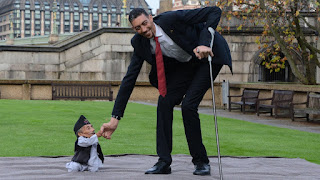At Home With Cornish 24
In our earlier lessons, we have looked at common questions and suitable answers involving ourselves. Now we are going to expand this and look at how you can build your own sentences.
Let's start with sentences involving identities and descriptions.
If
someone asks me "Piw os ta?" (this is familiar)
or "Piw o
whei?" (this is more polite)
meaning "Who are
you?"
I can answer
"Tho vy Jan" meaning "I'm Jan".
Or I
can say "Jan o vy."
If you
want to ask who someone else is, you can say:
"Piw
ew ev?" Who is he?
"Piw
ew hei?" Who is she?
"Piw
ew anjei?" Who are they?
An
answer might be:
(they
all mean the same, with different emphasis: He is Peter.):
Peder ew ev. He
is Peter.
Ev ew Peder. He
is Peter.
Thew ev
Peder. He is
Peter.
I can
also expand my answer to include what I am like, e.g.
Tho vy
descadores. I am a teacher.
(or Descadores
o vy.)
Tho vy
pajar ügens bloodh. I am 80 years old.
(or Pajar
ügens bloodh o vy.)
Now we
can expand this pattern to include others.
Try starting
your sentence with one of these:
Tho vy
… I am …
Tho
chy … You are …
(friend or family)
Thew
ev …
He is …
Thew
hei … She is …
Tho
nei … We are …
Thow
whei … You are … (polite or more than one)
Thew
anjei … They are …
Or you
can start your sentence with a name, e.g.
Thew
Peder … Peter
is …
or Peder
ew …
Thew
Maria … Mary
is …
or Maria
ew …
e.g.
Thew
Henry hager. Henry
is horrid
Henry
ew hager.
Thew
Peder perfydh. Peter
is perfect.
Peder
ew perfydh.
Or you
can start your sentence with a noun, e.g.
Thew
an kei … The dog is …
or An
kei ew …
Thew
an gath … The cat is …
or An
gath ew …
Thew
an flehes … The children are …
or An
flehes ew …
e.g. Thew
an flehes lôwen. The children are happy.
An
flehes ew lôwen.
Here are some more descriptions to end your sentence.
|
|
hir tall berr short |
|
|
|
|
bras big bian small |
|
|
drog bad da good |
|
|
|
|
lôwen
happy trûan sad |
|
|
|
crowsek grumpy gòcky silly |
|
|
berryk plump moon thin |
|












Comments
Post a Comment